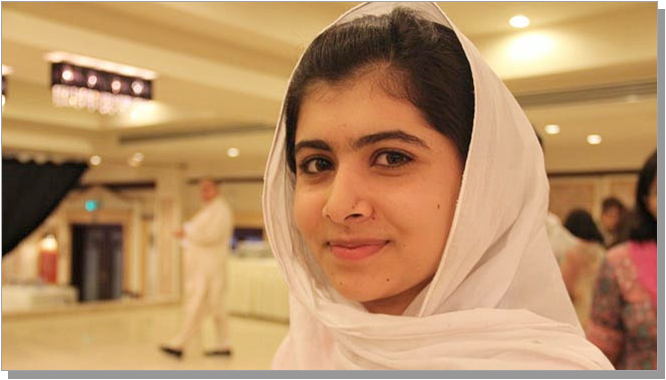The fight for girls’ right to education seems to be neverending, and yet according to the Universal Declaration of Human Rights, Article 26, everyone has the “right to education”. And Article 2 states that “everyone is entitled to all the rights and freedoms set forth in this Declaration, without distinction of any kind”, including sex.
Malala Yousafzai was merely eleven when she started blogging entries from her diary for the Urdu-language website of the BBC. Her pen name was Gul Makai, which meant cornflower in Pashto and was also the name of the heroine of many local folk stories. As a girl living in Pakistan, she wrote about life under Taliban rule. In January 2009, her first month of blogging, she wrote, “Today our teacher told us not to wear colorful dress that might make Taliban angry.” At the time, the Taliban was banning music, television, and, perhaps the worst of all, forbidding girls from going to school.
Yousafzai recorded her thoughts on the blog while militants blew up more than 100 girls’ schools. It was declared that as of January 15th, 2009, girls would no longer be able to attend school. The day of the deadline she wrote: “I had a terrible dream yesterday with military helicopters and the Taliban. My mother made me breakfast and I went off to school. I was afraid going to school because the Taliban had issued an edict banning all girls from attending schools. Only 11 pupils attended the class out of 27.” She spoke out against the Taliban on the national current affairs show Capital Talk on February 18th. Three days later, local Taliban leader Maulana Fazlullah announced on his radio station that he was lifting the ban on women’s education, and girls would be allowed to attend school until exams. After March 12th, her online diary ended.
Shortly after, she appeared on the national Pashto-language station, the Urdu-language Daily Aaj, and Canada’s Toronto Star. She made a second appearance on Capital Talk on 19 August 2009. Her BBC blogging identity was being revealed in articles by December 2009. She also began appearing on television to publicly advocate for female education.
As she gained eminence, however, she also gained enemies. She received death threats and was shot by the Taliban twice in an assassination attempt, and yet in an address to the United Nations she said, “Dear Friends, on the 9th of October 2012, the Taliban shot me on the left side of my forehead. They shot my friends too. They thought that the bullets would silence us. But they failed. And then, out of that silence came, thousands of voices. The terrorists thought that they would change our aims and stop our ambitions but nothing changed in my life except this: Weakness, fear and hopelessness died. Strength, power and courage was born. I am the same Malala. My ambitions are the same. My hopes are the same. My dreams are the same.”
Just this week, she was presented with the European Parliament’s Sakharov Prize for Freedom of Thought 2013. She graciously accepted the award, but also stated that the battle for education is not over: “There are millions of girls across the world who aren’t eligible to join school due to different situations, there are girls who can’t get higher education due to early marriages, there are girls who are threatened, there are girls who are tortured.”
Globally, there are 66 million girls who don’t attend school. Just as Hillary Clinton told Newsweek back in 2011, I believe the rights of women and girls are the unfinished business of the 21st century. I believe the Taliban is wrong in forbidding girls to get an education. How dare they deny someone any of their basic human rights? It’s not just wrong. It’s abhorrent. In honor of the recently passed Nelson Mandela, I would like to say “Education is the most powerful weapon we can use to change the world.” Education yields more power than guns or bombs could ever hope to; books and pens are our most powerful weapons. These circumstances around the world, ones where girls are denied the right to go to school, need to be taken more seriously.
I stand with Malala. Do you?










